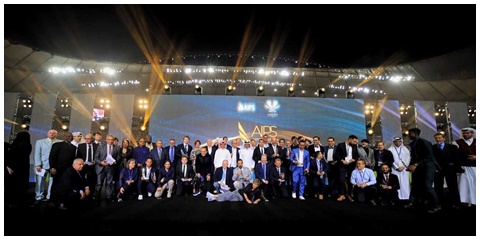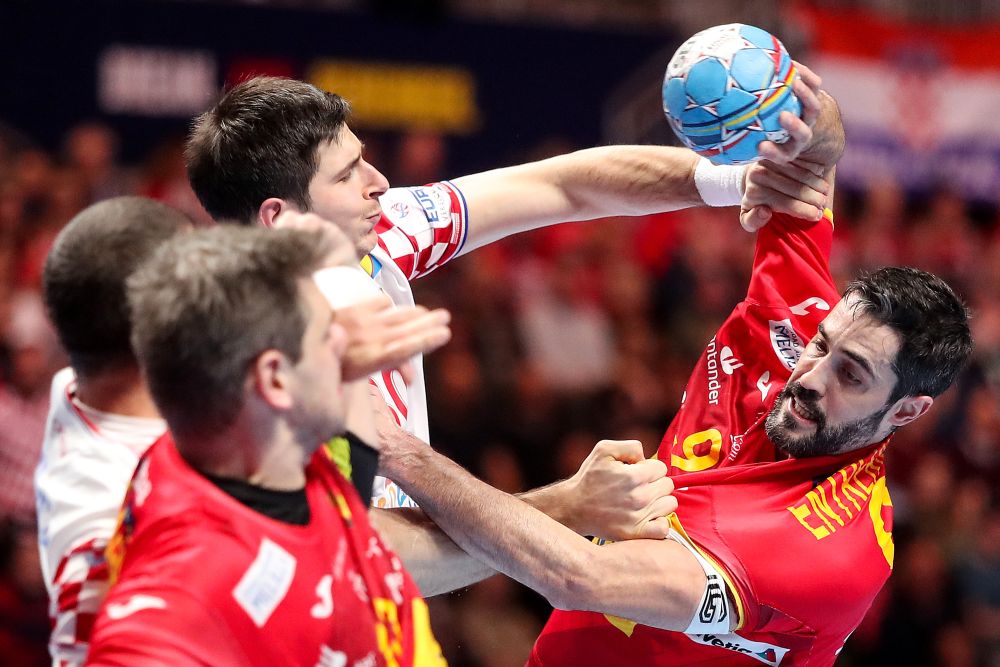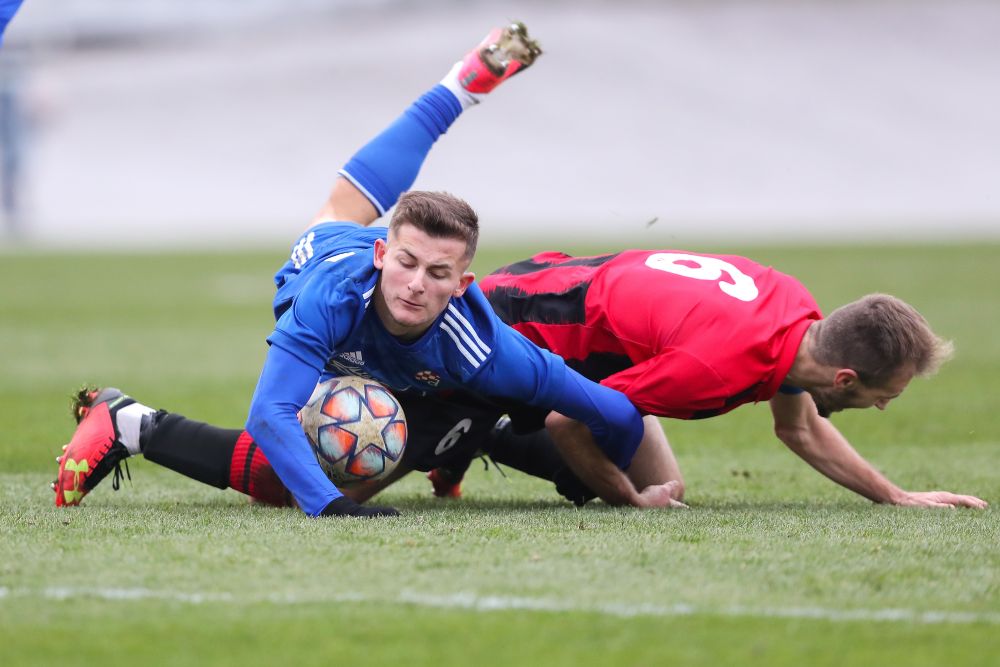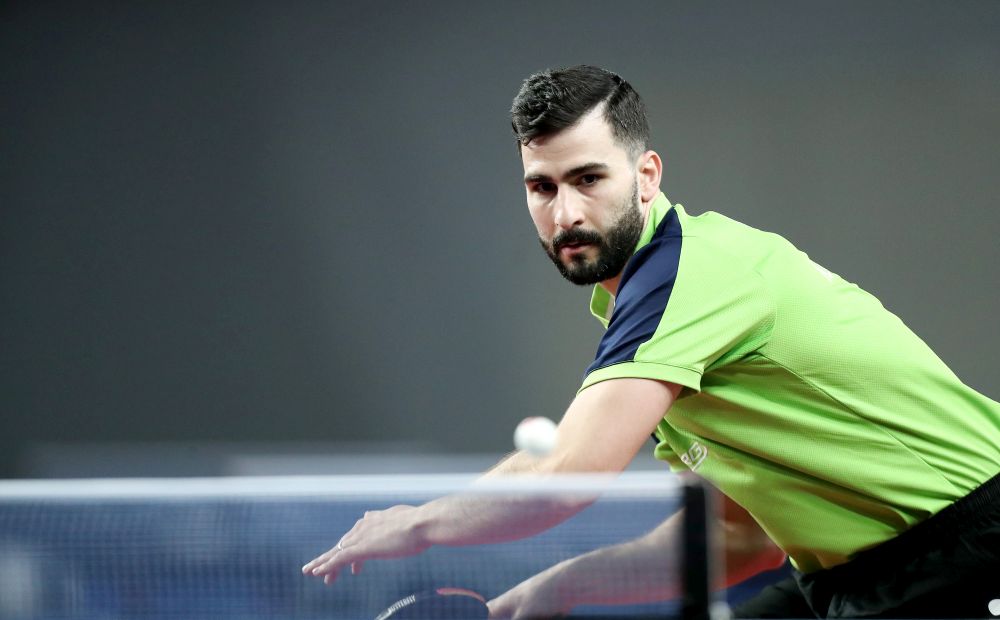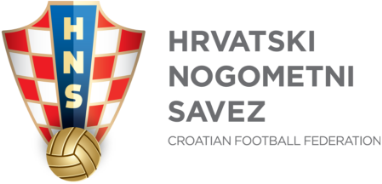DOHA, June 12, 2022 - A stunning open-air ceremony at Khalifa International Stadium, under a shining Full Moon in Doha, saw the closure of the AIPS Sport Media Awards 2021 edition.
There were tears, there was joy, and there were powerful and emotional speeches. It was a night for journalism, for journalists. It was a night in which the football pitch was not to report from the stands, but to jump in and celebrate a profession that is not a job, but a mission and a passion.
After the last Jury voting, on Saturday, the podium of the winners was finally unveiled. During a little more than one hour, more than 30 journalists, photographers and videographers became the new reference of sports media excellence. Serbia, China, USA, France, Australia, Brazil, Bulgaria, Algeria, Namibia, UK, Iran, New Zealand, Argentina, Puerto Rico, Ghana, Uganda, Italy, India… the five continents represented in a ceremony that marked the first AIPS Awards reunion post Covid-19 pandemic.
The gala, hosted by Italian journalist Valentina Clemente, kicked off with an emotional moment. Mentor Riccardo Romani, who covered the war in Ukraine and was present in war scenarios in Afghanistan and Irak, introduced the story of Ukrainan journalist Vladislav Dunaienko, who after being part of the Young Reporters Programme in Lausanne, in November 2019, chose to become a soldier following the Russian invasion of his territory.
“When I teach my class during our Young Reporters Programmes, I make aware our young students about the challenges posed by the constant changing of journalism. I say. Adapt or Die. Never, in my darkest nightmares I would have thought those three words could become so real and frightening,” said Romani, who underlined the power of sports to build bridges to overcome conflicts. “We, as journalists of sport, are the construction workers of those bridges. Its’ our duty now to work even harder to make them stronger. We owe this to the profession we love so deeply. We owe this to Vlad Dunayenko,” he said.
AIPS president Gianni Merlo went on stage: “Our association is organising a lot of Young Reporters Programmes, as the one where Vlad was, to show them the way. This is the path we’ve started in 2016, as we decided to invest in culture. Our commitment is to keep sport clean, and our only possibility is to build bridges, as Romani said,” said Merlo.
In the Photography Sport Action category, winner was Andrej Isakovic (Serbia), for his incredible “The Halo Effect” (AFP), the F1 picture showing Verstappen’s car on top of Hamilton’s, the tyre almost touching his helmet. Isakovic was followed by André Durâo (Brazil) and Félix Sánchez Arrazola (Spain).
“I hope you’ve liked all the pictures shown in the podium, because this is what we do everyday. And today I’m more excited than when I took the picture of the Formula 1,” said Isakovic.
In the Writing - Best Colour Piece category, the first place went to Wufei Yu (China) and WIll Ford (USA), followed by José Encarnación (Puerto Rico) and Nick Hope (UK).
Will Ford picked the prize and said: “Thank you to Wufei Yu, who is in Beijing and couldn’t come because of COVID restrictions, but I know he’s watching the ceremony, and thank you to the Jury and to AIPS for this,” said Ford. The ultramarathon of 100k in China, that ended in the tragedy with 21 runners dead, was published in the magazine Runner’s World.
In the Video Documentary category, the winner was Matthieu Darnon (France), followed by David Harrison (UK) and Christoph Nahr (Germany). Darnon’s submission was Backdraft (Canal+), that tells the story of Romain Grosjean, who miraculously survived a horrific F1 crash during the Bahrain Grand Prix: his car hit the barriers, split in two, and caught fire. It took 28 seconds for Grosjean to emerge from his burning Haas car that night. The documentary reveals how Grosjean himself and witnesses experienced that moment of horror.
In the Audio category, the first place was for Tracey Holmes (Australia), followed by Dario Ricci (Italy) and Ronny Blaschke (Germany).
“I have to congratulate every single person sitting over there to keep inspiring to make a change, thanks to AIPS to continue to recognise the value of our work. I’d like to thank our hosts, Qatar, in this year of the 2022 World Cup, which cames with challenges, but that will remembered by how you’ve faced those challenges, the men and women from Qatar. And finally, to the Afghan athletes, the women that were asking for help, and whose voice was heard,” said Holmes.
Holmes created not just a stunning audio piece for her podcast The Ticket, but also managed to set up the rescue mission that saved more than 100 Afghan athletes and their families from the Taliban regime, and she did it all while being in hotel quarantine after coming back from the Tokyo Olympics.
In the Photography Portfolio category, the first place went for Ueslei Marcelino (Brazil), followed by Clive Mason (UK) and Lo?c Venance (France).
Marcelino made an impressive Tokyo 2020 boxing portfolio that showed the passion for the sport, from the ambience to the key moment of tasting the golden medal. “This is also for the Brazilian boxers that made their best effort,” said Marcelino in tears.
Investigative reporting saw three winners: Omar Boudi, Zoher Boudi, for “The drama of Algerian players and their disabled children” (Echorouk TV), a film that showed the team-mates of a football team whose children were born with disabilities, possibly linked to substances they were given without their knowledge of side-effects. Dimitar Tasev (Bulgaria) made another doping investigation with “Doping in deep water” (BTV Media Group). Finally, Michael Uugwanga (Namibia) was awarded for revealing the situation of poorly paid boxers that are risking their lives just for a few coins (Confidente Sport).
In the Video Athlete Profile category, the first place was for William Moss (USA), followed by András Muhi Pires (Hungary) and Mengtong Niu (China).
Moss worked on the story of Jordan Burroughs (NBC), an Olympic and world champion in wrestling that prepared for the Olympics qualifying with one mission: show his family the power of never quitting. “The person that I want to thank the most is Jordan Burroughs, who is the most incredible and inspiring person I’ve met,” said Moss.
In the Writing - Best Column category, the winner was Kate Rowan (UK). Second came Marcela Mora y Araujo (Argentina) and third, Emanuela Audisio (Italy).
Rowan claimed the prize but couldn’t reach the ceremony on time, following difficult family circumstances. Her column in The Telegraph (UK) speaks for herself: it is the story of how she became one of the few men’s rugby female journalists, and how she was systemically abused by characters of a system that does not accept women.
In the Video Short Feature category, the winner was Maziyar Koupidar (Iran). Second came Heidi Iro (Austria) and third were Julien Ababsa and Guillaume Papin (France).
Koupidar worked on an independent production to tell the story of four Afghan sisters refugees in Iran who love football and Cristiano Ronaldo.
The Young Reporters category had three winners: Joe Allison (New Zealand) in Photography, José Encarnación (Puerto Rico) in Writing and Francis Hema (Ghana) in Broadcasting.
“I like to thank the Jury, AIPS, Doha for having us, and also my dad, who is in the crowd, and my mom, who is watching from home. Also thanks to Getty Images for given me the opportunities. It is an incredible privilege to be here,” said Allison.
Encarnación’s story was also second in Best Colour Piece, and it is the story of the Camarero racetrack in Puerto Rico, where more than 1400 horses were euthanised in strange circumstances in the same veterinary. “I like to thank to my grandfather, who helped me a lot in this investigation, and passed away shortly after it was published. And I like to thank everyone that keeps fighting against crime and corruption in sport,” said Encarnación. “I don’t know where to start. One thing that kept me going is the passion”.
The Special categories celebrated the career of Joe Lartey (Ghana), a 95-year-old legend for African journalism. “I’ve been saying thank you since I left Ghana, and was brought here, and I keep saying thank you. Since the creation of the national association in Ghana, progress was made. And progress in sports journalism will continue until the end of time,” said Lartey, who received an outstanding ovation by awardees and guests in the most emotional moment of the gala.
Special commendations were given for different subjects. Sport for Hope saw David Picker (USA) for “A Shared Pastime” (NBC) an emotional video about the baseball team that was created right after Fukushima disaster in Japan, to offer a way out of the disaster. Sports for the next Generation was for Jonatan Taylor (Ireland) for “Mariah, a boxer dream” (The Olympic Channel), telling the story of a Native American that wants to go to the next Olympics. Sanket Jain (India) received it for Young Reporter Special Coverage (People’s Archive of Rural India, India) for a story about wrestlers which he wrote and photographed. José Ignacio Pérez Hernández and Miguel Carbonero (Spain) received the a certificate of merit for Interactive Reportage (Marca, Spain), a modern layout telling the story of how one man, the current Colombian ambassador in the US, was kidnapped by Pablo Escobar’s cartel and how football kept him alive.
Cristina Macfarlane, Ivy Nyayieka and Jo Shelley (UK) received the special mention for Human Rights and Gender Equality, for Running as Equals (CNN), a thorough report explaining from all possible perspectives the transgender problem and the many athletes that were left behind by a ruthless system.
Pier Bergonzi (Italy) received the mention for Outstanding Interview (La Gazzetta dello Sport) following his rare one-on-one with Pope Francis, in which he speaks about football, fair-play, the perils of doping and other sports issues. And with his Documentary “Standing Firm: Football’s windrush story” (BT Sport), on the Caribbean influence in British football, Theo Lee Ray (UK) received a mention for Combatting racism and discrimination in sport. From Uganda, Fred Mwambu was awarded for Original Story, as he reported how COVID-19 tests were being manipulated in order to rule out the best players when they had to play African Champions League fixtures abroad, only to find out that they were negative upon reentering (Monitor). Finally, Emiliano Nunia (Argentina) received the Special Commandment for Audio Reporting (Radio Villa Trinidad, Argentina), for interviewing the father of Pep Guardiola right after the Champions League semifinal. Nunia lives in a very small town but from there, he manages to make interviews that are picked all over the world.
In the end, photos representing the Silent Olympics were shown. It was a memory of a very special Tokyo 2021. “It’s something really special. And after this, we have to look to the future, and the next Award is the future, in two days we will open the submissions to the next edition. And I would like to call Sheikh Faisal Bin Ahmad Al Thani on stage, because without him, we wouldn’t have been able to create this prize,” said Gianni Merlo. “We hope to look in a better way for the future. And that’s that I can announce that next year, we will go on an island, Crete, in Greece. And in the 2024, it will be in París, to celebrate the centennial of AIPS,” concluded Merlo.
After the celebration on stage, and the final group photo, it came the moment of selfies. And the AIPS Sport Media Awards, under the moon of Doha, shined once again.
Congratulations to all winners, congratulations to all participants, the EC members and Jury members, the AIPS staff, the QSPC staff for creating this special ceremony. And for making it indelible.
VIDEO Svečanost dodjele novinarskih nagrada AIPS-a za 2021. godinu: https://www.youtube.com/watch?v=s-pcSJMKM_Y VIDEO (cijela svečanost) https://www.youtube.com/watch?v=_X4MWN1mSsM&ab_channel=AIPSMediaChannel
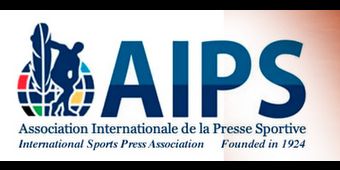 AIPS Media AIPS Media/ Martin Mazur Foto: Carlo Pozzoni
AIPS Media AIPS Media/ Martin Mazur Foto: Carlo Pozzoni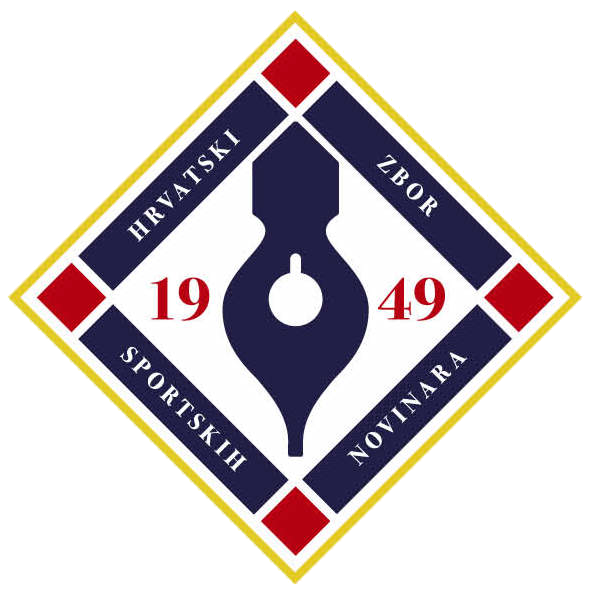
 EN
EN HR
HR





